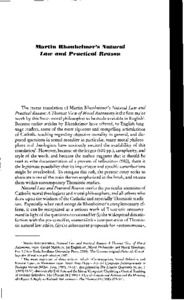Por favor, use este identificador para citar o enlazar este ítem:
https://repositorio.uca.edu.ar/handle/123456789/12630| Título: | Martin Rhonheimer's natural law and practical reason | Autor: | Murphy, Jr., William F. | Palabras clave: | Rhonheimer, Martin; DERECHO NATURAL; FILOSOFIA POLITICA; RAZON PRACTICA; FILOSOFIA MORAL | Fecha de publicación: | 2001 | Editorial: | Pontificia Universidad Católica Argentina. Facultad de Filosofía y Letras | Cita: | Murphy, Jr., W. F. Martin Rhonheimer's natural law and practical reason [en línea]. Sapientia. 2001, 56 (210). Disponible en: https://repositorio.uca.edu.ar/handle/123456789/12630 | Resumen: | Abstract: The recent translation of Martin Rhonheimer's Natural Law and Practical Reason: A Thomist View of Moral Autonomy is the first rnajor work by this Swiss moral philosopher to be made available in Englishi . Because earlier articles by Rhonheírner have offered, to English language readers, some of the most rigorous and compelling articulations of Catholic teaching regarding objective morality in general, and disputed questions in sexual morality in particular, many moral philosophers and theologíans have anxiously awaited the availability of this translation2. However, because of the length (620 pp.), complexity, and style of the work, and because the author suggests that it should be read as «the documentation of a process of reflection» (580), there is the legitimate possibility that its importance and specific contributions rnight be overlooked. To mitigate this risk, the present essay seeks to elucidate some of the main themes emphasized in the book, and situate them within contemporary Thomistic studies. Natural Law and Practical Reason meras the particular attention of Catholic moral theologians and moral philosophers, and all others who draw upon the wisdorn of the Catholic and especially Thomistic tradition. Especially when read alongside Rhonheimer's cornplementary efforts, it can be recognized as a serious work of Thomistic ressourcernent in light of the questions occasioned by (i) the widespread dissatisfaction with the pre-conciliar, «naturalistic» interpretation of Thomis tic natural law ethics, (ii) the subsequent proposals for «autonomous», «teleological» or «proportionalist» ethics3, (iii) the alternative proposal of «the new natural law theory» associated especially with Grisez, Finnis, and Boyle, and (iv) the need for a retrieval and development of Thomistic moral philosophy that might complement the new appreciation of Thomas as a theologian. Moreover, Natural Law and Practical Reason seeks to respond to the concerns of modern, and especially Kantían, moral philosophy to articulate the «autonomous» character of moral action; it does so through a Thomistic articulation of «the autonomy of man in God», or «participated theonomy». This «participated theonomy» is evident when the second part of the Summa is read in light of its prologue, which teaches that man is the source (p rincipiu m) of his actions as having free will and control over them. | URI: | https://repositorio.uca.edu.ar/handle/123456789/12630 | ISSN: | 0036-4703 (impreso) 0036-4703 (on line) |
Disciplina: | FILOSOFIA | Derechos: | Acceso abierto | Fuente: | Sapientia. 2001, 56 (210) |
| Aparece en las colecciones: | SAP - 2001 Vol LVI nro. 210 SAP - 2001 Vol LVI nro. 210 |
Ficheros en este ítem:
| Fichero | Descripción | Tamaño | Formato | |
|---|---|---|---|---|
| martin-rhonheimers-natural.pdf | 665,23 kB | Adobe PDF |  Visualizar/Abrir |
Visualizaciones de página(s)
65
comprobado en 27-abr-2024
Descarga(s)
504
comprobado en 27-abr-2024
Google ScholarTM
Ver en Google Scholar
Este ítem está sujeto a una Licencia Creative Commons

